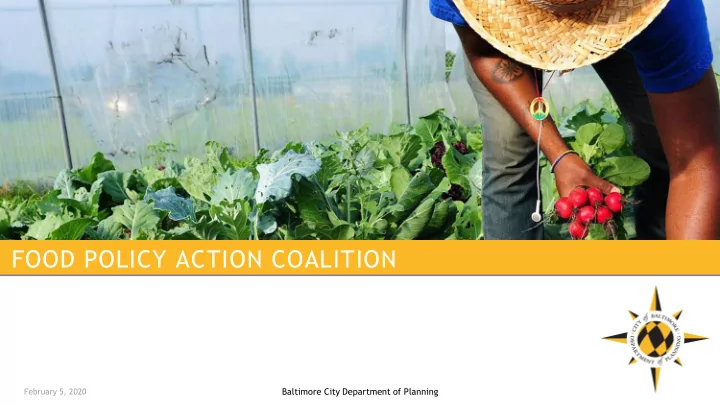

FOOD POLICY ACTION COALITION February 5, 2020 Baltimore City Department of Planning
INTRODUCTIONS & UPDATES
It takes more than food to end hunger.
Many are forced to make tough choices.
Last year, with the help of our volunteers and donors, we moved the equivalent of 37 million meals
That’s 45 million pounds of food! Where does it all come from? Donations from retailers, distributors, and manufacturers • Contract growing • Purchasing • Government commodities • Middle Mile Program Vendors •
Go Gover ernment P Programs s – FI FIX TH THIS SL SLIDE
Strengthen the Paruner Network
Thank you! For being part of the movement to END HUNGER.
ABAWD Policy Update MD Hunger Solutions
What is an An Able-Bodied Adult Without Dependents (ABAWD) is: ABAWD? ● Age 18-50 ● Unfit for work due to a mental, physical, or emotional disability ● Has no dependent adults or children in their care
Under current USDA regulations, ABAWDs can only receive SNAP benefits for 3 months in a 36 month period unless they meet a “work requirement” of 20+ hours a week of work, job training, volunteering, and/or seeking work.
A waiver to the work requirement can be Waivers submitted by the governor for any jurisdiction that meets a certain level of unemployment. In MD; the Eastern Shore, Western MD, and Baltimore City are all waived jurisdictions.
Proposed ● To go into effect April 1, 2020 ● Increases level of unemployment in Change jurisdiction needed to apply for waiver ● Eliminates most jurisdictions from having the waiver ● 23,664 ABAWDs would be affected (DHS)
What can be ● Categorizing ABAWDs as unfit for work done? ● Boosting participation in SNAP E&T programs ● Educating current ABAWDs ● Litigation - Thank AG Frosh!
THE FINAL RULE IMPACT ON BALTIMORE CITY Escalates Harms Local Food Economy Insecurity Increases Negatively Burden on THE RULE Impacts Social Crime Rate Services Increases Increases Burden on Healthcare State Costs Agencies Baltimore City Department of Planning 17
THE FINAL RULE IMPACT ON BALTIMORE CITY • Escalates Food Insecurity • 1 in 5 residents are food insecure 23.5% of residents live in Healthy Food • Priority Areas Harms Local Economy • • 11,000-15,000 ABAWDs anticipated to lose SNAP benefits • $24.4-33.3 million dollar loss from SNAP spending Increases Healthcare Costs • Food Insecurity is associated with poorer • general and mental health for individuals of all ages • Low-income adults on SNAP spend ~25% less on medical costs than non- participants Baltimore City Department of Planning 18
THE FINAL RULE IMPACT ON BALTIMORE CITY Negatively Impacts Crime Rate • Increases in food insecurity in the US • results in increased violent crime ABAWDs will lose SNAP July 1, 2020 – • corresponds with typical seasonal peak in crime in Baltimore City • Increases Burden on State Agencies • Baltimore City Department of Social Services (BCDSS) and Maryland Department of Human Services (DHS) • Maryland’s SNAP E&T program currently serves only a few hundred ABAWD • Insufficient workforce development Increases Burden on Community • Based Organizations Social services will become more • strained as they are sought after by more people Current services will not be able to • absorb increased demand Baltimore City Department of Planning 19
Questions?
DISCUSSION GROUPS
FOOD POLICY ACTION COALITION DISCUSSION GROUPS SNAP/ABAWD JD Robinson & Holly Freishtat Maryland Food Bank / FoodWorks Tim Regan Food Procurement Allison & Dan Corbett Corner Stores Alice Huang
USING AN EQUITY LENS
USDN EQUITY LENS PROCEDURAL EQUITY Inclusive, accessible, authentic engagement and representation in processes to develop or implement programs and policies QUESTION: How are residents who have been historically excluded from planning processes being authentically included in planning, implementation, and evaluation of the proposed policy or project?
USDN EQUITY LENS DISTRIBUTIONAL EQUITY Programs and policies result in fair distributions of benefits and burdens across all segments of a community, prioritizing those with highest need QUESTION: Does the distribution of resources and investment explicitly account for potentially racially disparate outcomes?
USDN EQUITY LENS STRUCTURAL EQUITY Decision makers institutionalize accountability; decisions are made with a recognition of the historical, cultural, and institutional dynamics and structures that have routinely advantaged privileged groups in society and resulted in chronic cumulative disadvantage for subordinated groups QUESTION: What historic advantages or disadvantages have affected residents in the given community? And how are policies and programs addressing them?
USDN EQUITY LENS TRANSGENERATIONAL EQUITY Decisions consider generational impacts and don’t result in unfair burdens on future generations QUESTION: Does the policy or project result in unfair burdens on future generations?
CLOSING
THANK YOU! Holly Freishtat Baltimore City Food Policy Director Holly.Freishtat@baltimorecity.gov Alice Huang Food Access Planner Alice.Huang@baltimorecity.gov https://planning.baltimorecity.gov/Baltimore-food-policy-initiative
Recommend
More recommend